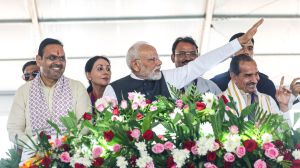Naxals show their writ runs in Bihar
GAYA, FEBRUARY 14: When you travel along Bihar's countryside, never make the mistake of judging people by their looks. A haggard villager ...

GAYA, FEBRUARY 14: When you travel along Bihar’s countryside, never make the mistake of judging people by their looks. A haggard villager sipping tea in a dirty roadside restaurant can give you a lesson on capitalism and communism.
Take Shahabuddin for instance. Sitting with his friends at a dhaba in a village near Jehanabad, he warms up when asked for his views on the Assembly elections. Dispensing with questions on the prospects of vaious contestants with ease, he turns serious when you ask him about the Naxalites. “Hasn’t there been a dilution of the ideals of the Naxals? Hasn’t their politics also taken on a casteist colour?”
After a considered “yes” in reply, he counters: “There are capitalists and communists in every community but isn’t caste and class generally synonymous?” Shahabuddin, you realise, is a sympathiser of the Naxals but is unhappy that their ideology is getting diluted.
In Jehanabad, Gaya and Nalanda districts of central Bihar and others in south Bihar, the influence of theNaxal outfits, the Maoist Communist Centre and the People’s War Group, is pervasive. Frequent clashes between the upper castes and the Dalits in the region have led to several massacres, like the ones at Lakshmanpur-Bathe and Narayanpur in the past two years. The ultras collect taxes and hold their jan adalats or kangaroo courts, dispensing justice and meting out gory punishments. The state remains a mere spectator.This time too the Naxals have called for a poll boycott in these districts as also in the southern districts of Chatra, Palamu, Hazaribagh, Ranchi and Dhanbad. In many constituencies in south and central Bihar, candidates have been prevented from campaigning and their vehicles burnt. Naxals blackened the face of an Independent candidate who had invited their ire.
But then, many concede that the boycott calls are “selective”. If they want a particular candidate to win, they don’t come in the way. As Ramjatan Sharma, secretary of the state CPI(M-L), says: “Despite the calls for boycott ofpolls, they associate themselves with one or the other party during the elections.”
There has been talk that the MCC and Laloo Prasad Yadav have struck a deal. The MCC will most likely not upset the RJD’s chances in exchange for withdrawal of cases against its cadres.
Yet, the administration cannot take chances. For instance, the district administration in Jehanabad has not received any letters from the MCC about a poll boycott in the district. “But since their philosophy negates the concept of electoral democracy, we cannot remain complacent. Our operations over the past six months has denied the ultras a free run,” says District Magistrate Jyoti Bhramar Tubid.
He concedes that there is a lot of sympathy for the Naxals but emphasises that ironically, the poor themselves become their targets very often. “Moreover, there is a lot of internecine warfare with outfits fighting against each other for supremacy. The committment of the cadres to the ideology is not strong enough and there is a lot ofdefections across these groups.”
Despite the administration’s claims of a strong mobilisation of security forces, people don’t feel secure. As one villager put it: “Whatever be the mobilisation, on polling day when violence takes place, the police look the other way.”




- 01
- 02
- 03
- 04
- 05


























